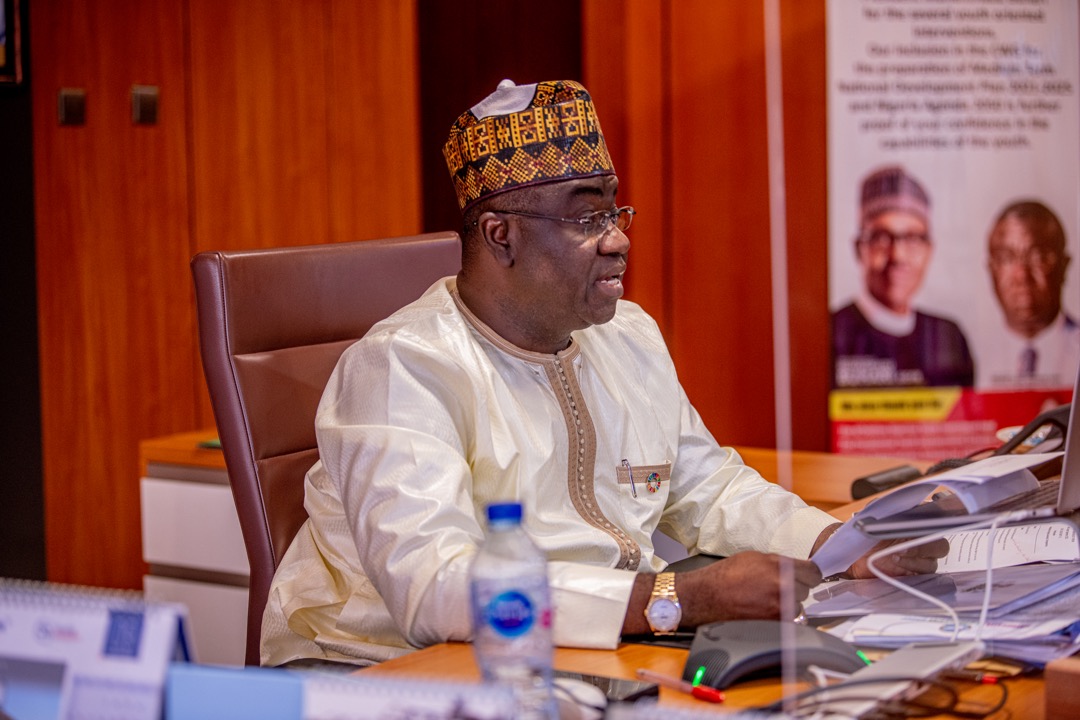
Minister of State for Budget and National Planning, Prince Clem Ikanade Agba, at the launch of the Opening Extractives Global Beneficial Ownership Transparency Implementers’ Forum on Tuesday, September 7, 2021.
Minister of State for Budget and National Planning, Prince Clem Ikanade Agba, said that Nigeria was fully committed to the Open Extractives Programme and all that it represented, even as he noted that the programme was coming at a time that President Muhammadu Buhari had just signed the Petroleum Industry Bill into law.
Agba spoke on Tuesday (September 7, 2021) in his capacity as the State Actor Co-chair of Nigeria Open Government Partnership at the launch of the Opening Extractives Global Beneficial Ownership Transparency Implementers’ Forum.
The minister of state for budget and national planning represented the minister of finance, budget and national planning, Mrs Zainab Ahmed at the virtual meeting that held in London.
In his address at the meeting, Agba said: “Let me once again, convey to you, Nigeria’s full commitment to the Open Extractives Programme and all that it represents. This programme is timely, coming at the time President Buhari has just signed the Petroleum Industry Bill into Law and the implementation of the new law is about to commence.
“It is therefore a programme that we intend to fully explore under the new law to advance and deepen the progress our country has already recorded in the implementation of Beneficial Ownership disclosures as part of the ongoing reforms in our extractive industries under the EITI framework and Open Government Partnership.”
He continued: “You will recall that at the London Anti-corruption Summit in May 2016, President Muhammadu Buhari committed to a series of measures aimed at curbing corruption and blocking revenue leakages.

“In announcing Nigeria’s intention to join the Open Government Partnership and re-affirming our obligation to the EITI process, President Buhari committed to establishing an open register of beneficial owners of companies operating in Nigeria.
“I note that our commitments as a country to EITI and the Open Extractives Initiatives as key drivers of Beneficial Ownership Disclosures are in view of the direct linkages to our government’s strategic development challenges and priorities – curbing corruption through blocking channels of illicit financial flows, tax evasion and money laundering, and improving the livelihoods of citizens by building mechanisms through which government can be held accountable.”
According to him: “It is for these reasons that Nigeria worked collaboratively with the civil society to launch its Register of Beneficial Owners of Companies in the Extractive Sector in December 2019, to meet the EITI Requirement of member countries to develop such portals.
“The Corporate Affairs Commission – Nigeria’s companies registry, in furtherance of our commitment to ‘Establish a public central register of beneficial owners of companies’ under the Open Government Partnership is working to expand the register to cover all sectors.
“Last year, President Buhari signed the new Companies and Allied Matters Act into law. The new CAMA provides a legal backing for the Corporate Affairs Commission to collect and publish information of beneficial owners of companies.”
He added that “the disclosure of beneficial owners of companies will have a direct impact on the award of government contracts and granting of licenses and permits as well as support the work of anti-corruption, regulatory and tax authorities.
“For instance, when the new register being developed by CAC is fully operational, the Bureau of Public Procurement will require all companies bidding for government contracts to have an up-to-date information of beneficial owners available on the CAC website.
“The register will also be linked to the Federal Inland Revenue Services database as well as their banking information by the Nigeria Financial Intelligence Unit.”
Agba stated that at the country level, several collaborative efforts were ongoing between the Corporate Affairs Commission and NEITI, as the former continued to review the existing register of beneficial owners of companies in the Extractive Sector, to ensure that “the central register meets global standards and is user-friendly.”
He noted that this process was without its challenges, adding that “while civil society partners are actively working with us on the development of the register, it remains a challenge to convene the organised private sector to elicit their requirement and expectation of the register as they will be the primary source of data for and key users of the register.”
“There is also the financial assistance needed to expand on the ongoing effort. CAC and NEITI are also contributing budgetary allocation to complement support received from the OGP Multi-Donor Trust Fund and other donors,” he added.
He said that more was still needed to fully build a register that “meets global standards and contributes to the effort to drive transparency and accountability.”
Agba declared that the Open Extractive Programme presented an opportunity for country-peer-learning, knowledge sharing which would be very useful to broaden NEITI’s ability to implement EITI Principles and the objectives of the Open Extractive Programmes, and Beneficial Ownership Disclosures in particular.

According to him: “In many resource-rich developing countries, the revenues derived from oil, gas, and/or minerals can make a significant contribution to economic growth and development; indeed, if managed well, the extractives sector can make the difference between prosperity and poverty for millions of people.”
“But the extractives sector is also vulnerable to corruption,” he said, stressing that “the EITI and its partners therefore have a vital role to play in improving the governance of the sector around the world.”
